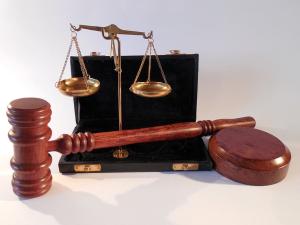
When seeking and promoting the common good, civil society often must permit various evils, not because it supports them, but because it recognizes that it cannot regulate and enforce each and every good. Sometimes things actually become worse when we try to use positive law to eliminate particular evils, either because those laws do not work (and so the evil will continue), or, as is often the case, they are replaced by something far more sinister, far more evil. This was the argument St. Augustine and St. Thomas Aquinas made when they said society should permit prostitution; they did not agree with its practice, but they believed that society would become much worse if prostitution were made illegal. Whether or not we agree with their argument concerning prostitution, the principle stands, and is an important one when dealing with civil society. While we must not promote libertine anarchism, for the common good is certainly destroyed by such laxity (as those who have money and power will have nothing to stand up against them as they use what they have to force their will upon others), we also cannot eliminate the freedom which we have been given, freedom which includes the ability to make bad choices for ourselves. Civil society must take into consideration the potential harm which comes from a particular evil, and the harm which comes from not allowing it, and determine through analysis, which evils should be prevented (such as murder, theft, or hate crimes) and which should be permitted (so as not to make things worse). Robert of Melun suggested that such prudence was what led Moses to permit divorce:
What Moses permitted was a dispensation. Since fornication is a lesser evil than murder, he permitted them to divorce their wives and take others lest they should be led to commit murder. That is, he permitted a lesser evil in order that a greater evil might be avoided. [1]
It might seem odd to say that the only options are that we either allow divorce, or accept there will be a great deal of murder, but the reality of history shows why this argument has validity. Women have been killed by their husbands, for all kinds of reasons (such as, for example, so-called honor killings). When women found themselves in an abusive marriage, with a husband who had little to no care for their spouse, and divorce was not possible, they had very little means to protect themselves (and so, they might in turn, have killed their husband in self-defense). Even if their spouse might not intend to kill them, physical abuse alone is reason enough for women to separate from their spouse. But it is also clear, historically speaking, men have been given all kinds of privilege, and so they often found a way to abuse their spouse, and have them killed when they wanted to be with someone else. Divorce gave women a chance to get out of such a terrible situation. Even when it is allowed, women often find themselves in danger because their husbands fear what will happen during their divorce proceedings. Of course, divorce also can be used to protect men from harm, from wives who have similar ill-will towards them; it is not just men who murder their wives, wives can and do murder their husbands. Knowing this, and many other factors which have led marriage to be a dangerous institution for one or both of the spouses, it is understandable why Moses (and society as a whole) accepts divorce as a possibility. Women who are threatened by their husbands do not need to feel shame or disgrace if they seek a way to end their civil connection with their spouse, indeed, it is clear, divorce sometimes is embraced so as to prevent a graver evil. When we understand this in regards divorce, and why divorce can be and is permitted, we can also understand why civil society might also have to permit many other things which we prefer did not happen. We must engage each particular issue with prudence, determining if things would be worse if they are allowed or if they are not permitted.
As God is not deemed unjust and evil for permitting various evils in the world, thanks to the freedom God has given to creaturely subjects, so society must not be judged as necessarily being evil when it does likewise. When society, in its prudence, decides to allow some particular evils, it must not be understood as promoting or supporting them; rather it must be understood as trying to provide the greatest good to society, a good which must include some level of human freedom in the equation, for that freedom is not only a good, but one of the great goods given to humanity. Not only should we imitate God in giving freedom to society, we must also work to be gracious and merciful to its members, as the Jewish sage Abba Saul explained: “Abba Saul says, ‘It means that one should imitate Him. As He is gracious and merciful, so should you be gracious and merciful.’”[2] Society should promote the common good, doing what promotes it the best. This is why we must not only permit various evils, but also be merciful to those who execute them . Of course, we can make mistakes, our judgments and determinations can be wrong, and so upon further analysis, society can and will change what it does and does not permit as needed.
A society which is guided by a strict moral legalism, such as suggested by some theocracies and integralists, might at first glance seem sound. They promote and accept only that which can be proven to be good, which means, they often strictly punish those who do not follow them in doing what is right. They have little to no room for the freedom which God has given to the world. There is much cruelty involved in the execution of such governments, a cruelty which should prove how far they really are from the holiness and perfection they claim to promote. Their rigidness knows no prudence, and so no mercy; indeed, many in them enjoy the pain and suffering punishments bring to offenders, which is far from the way of God, who desires all to be saved without having to experience such punishments. “Therefore, most humane man, persevere in the service of humanity. Nothing is dearer to God than love. There is no surer sign of madness or of future misery than cruelty.” [3] It is such madness which we find happened in Florence under Savonarola, and it is such madness which we find in present day Russia, with its mix of church and state leading the church to be used as a tool of the state’s war against the world. Integralism, especially with its radical legalism, tends to present a terrible image of God, making God a tyrant so that the ruler of the state can likewise act as a tyrant; and in promoting such a society, integralists only show that they are themselves the kinds of people acting in ways which God’s justice decries.
God is love. Those who suffer, suffer not because of God, but because of what they establish for themselves. Their actions create the environment in which they live, and so, they create the conditions which lead to their own suffering. God is not the author of their suffering as God remains loving, willing to offer mercy and grace to all: “God is sweet by nature; they who move Him to bitterness are sinners, and they make God bitter for themselves. God does not change His nature, but sinners make God their bitterness.” [4] If we understand this, if we understand the leniency of God, and the grace God gives to help those who slip up and make mistakes, we should then use this as a way for us to determine how we should act in the world. We should imitate God and so by merciful to others; when we do so, we will find we will also receive mercy for ourselves: “For God is always merciful and lenient to that person who imitates Him in mercy, for the holy and the elect, the poor and the weak, all are in need of mercy, since not one of them can live in this life without sin.”[5]
When working for the common good, we must always act in prudence, looking for what best works to establish it. Society has to take all kinds of considerations into account when it makes its laws. It has to make and enforce laws which reflect the common good. It can’t just determine something is wrong and think that is enough for it to make it illegal; it has to determine if it is possible to eliminate that evil, and if it does, if society will truly be better off or not. This is why, though it must give flexibility to people so that they can do things which are not always good, it can’t allow evils to be done if such evils truly cause grave harm. Society has to establish a delicate balance as to what it permits and doesn’t permit; for without that balance, society will suffer, either by being too permissive of evils allowing such evils to destroy the common good or by being too restrictive with its laws, creating conditions in which people will act and do graver evils out of desperation.
[1] Robert of Melun, “Questions on the Divine Page,” in Interpretation of Scripture: Practice. Trans. Franklin T. Harkins. Ed. Frans van Leiere and Franklin T. Harkins (Turnhout, Belgium: Brepols, 2015), 329
[2] Reuven Hammer, trans. and ed., The Classic Midrash: Tannaitic Commentaries on the Bible (New York: Paulist Press, 1995), 104.
[3] Marsilio Ficino, The Letters of Marsilio Ficino. Volume 1. trans. by members of the Language Department of the School of Economic Science, London (London: Shepheard-Walwyn, 1975; repr. 1988), 101 [Letter 55 to Tommaso Minerbetti].
[4] St. Jerome, The Homilies of Saint Jerome: Volume I (1-59 On the Psalms). Trans. Marie Liguori Ewald, IHM (Washington, DC: CUA Press, 1963), 51 [Homily 7].
[5] St. Hildegard of Bingen, “Letter 307” in The Letters of Hildegard of Bingen. Volume III. Trans. Joseph L Baird and Radd K Ehrman (Oxford: Oxford University Press, 2004), 107.
Stay in touch! Like A Little Bit of Nothing on Facebook.
If you liked what you read, please consider sharing it with your friends and family!













